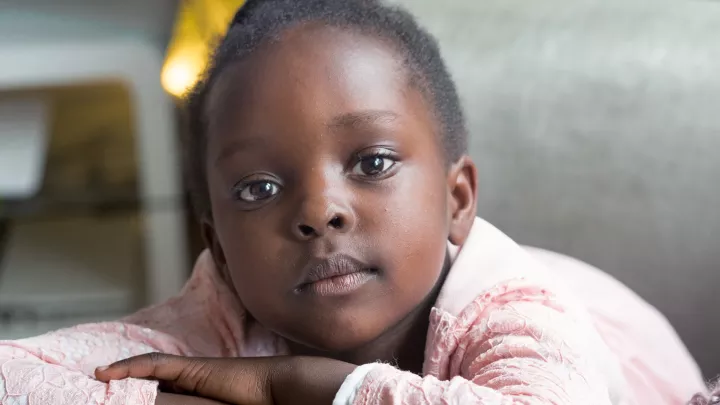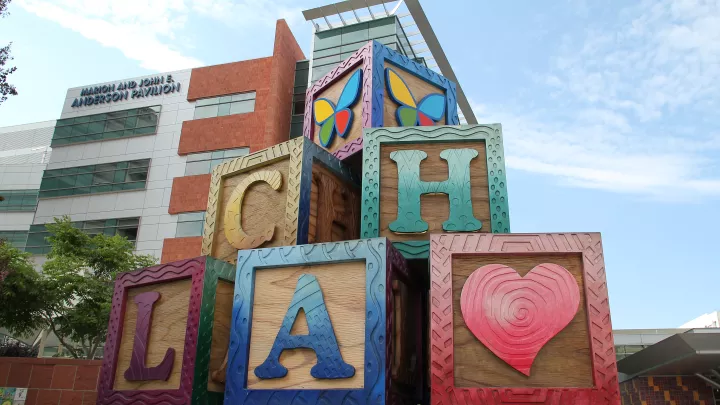Liver Tumor Program
The Liver Tumor Program at Children’s Hospital Los Angeles is one of the largest and most experienced programs in the country. Your child receives expert medical care from internationally recognized liver tumor specialists. We help your child get better so they can enjoy a healthy, active future.
Liver Tumor Program: Why Choose Us
The Liver Tumor Program at CHLA is part of our nationally recognized Cancer and Blood Disease Institute. Your child benefits from:
- Specialized testing: CHLA is among a select few children’s hospitals in the nation to perform onsite genetic tests for childhood cancers. Specialists in our Center for Personalized Medicine analyze the genetic makeup of every liver tumor. Getting these fast test results helps our team quickly determine the most effective treatment plan for your child.
- Leading-edge treatments: At Children’s Hospital, your child receives the latest and most advanced cancer therapies. Treatment options include chemotherapy, surgery and liver transplantation. We also offer new therapies such as chemoembolization and immunotherapy. Our specialists work with you to identify the best options for your child.
- Expert care team: A team of experts made up of various medical specialists, including hepatologists (liver specialists), oncologists, surgeons and molecular geneticists, works together to meet all your child’s health care needs. These experts meet regularly to discuss your child’s treatment plan.
- Innovative research: We have one of the nation’s most robust pediatric liver tumor research and clinical trials programs. Your child has access to innovative discoveries and therapies not widely available. For example, CHLA researchers pioneered new assessments and treatments for pediatric hepatoblastoma.
- Patient and family support: Our Survivorship and Supportive Care Program provides patients and families with the services and resources to manage a cancer diagnosis. We also have a dedicated Adolescent and Young Adult Cancer and Blood Disease Service.
What Are Pediatric Liver Tumors?
The liver removes harmful substances from blood. It also makes bile, which breaks down fats in food, and stores a sugar called glycogen that provides energy. Liver tumors are growths that form in liver cells and tissues. These abnormal masses affect how well the liver works.
Liver tumors in children are rare and require complex treatments. Liver specialists at CHLA treat all types of pediatric liver tumors.
Advanced Diagnostic Tests for Liver Tumors
There are different types of cancerous (malignant) and noncancerous (benign) liver tumors. We perform a variety of diagnostic tests, including advanced gene testing, to determine the tumor type and cause.
Diagnostic tests for liver tumors may include:
- Blood tests: A blood test assesses liver function and checks for tumor markers common in certain liver tumors.
- Imaging scans: We have the most sophisticated technology to capture high-quality images that guide treatment decisions. Our radiology and imaging team knows how to keep your child comfortable during an ultrafast CT scan, ultrasound or MRI. If necessary, we can give your child medication to help them remain calm and still during the scans.
- Liver biopsy: While your child is under anesthesia, our pediatric general surgeons remove (biopsy) small samples of tissue from the liver tumor. Our pathologists check this tissue for cancer cells.
- Molecular testing: Molecular pathologists and geneticists examine the tumor tissue for tumor markers and gene changes (mutations).
Comprehensive Liver Tumor Treatments
Our team uses the tumor markers and your child’s unique health profile to select the therapies that will provide the best treatment outcomes.
At CHLA, your child has access to all liver tumor treatments, including:
- Chemotherapy: Chemotherapy medication travels through the bloodstream. The medication shrinks the liver tumor, destroying it or making the tumor easier to surgically remove.
- Chemoembolization: CHLA was among the first in the country to offer this cancer treatment to children. It involves delivering a highly concentrated dose of chemotherapy directly into the artery that supplies blood to the liver. We also send another drug called an occluding agent that blocks blood flow to the tumor. This drug starves the tumor of its blood supply, causing the tumor to shrink.
- Immunotherapy and targeted therapy: These medications help the immune system find, target and destroy cancerous cells in liver tumors. We’re actively involved in clinical trials to develop new drugs for liver tumors and childhood cancers.
- Liver transplants: A liver transplant replaces a diseased liver with a healthy organ from a deceased donor, or a part of the liver from a living donor. We’re a national leader in pediatric liver transplants, achieving patient outcomes that often exceed the national average.
- Surgical resection: Our surgeons remove liver tumors while preserving as much of the healthy liver as possible to maintain liver function.
Innovative Research and Clinical Trials
CHLA doctors are national leaders in groundbreaking research to advance the understanding and treatment of liver tumors in children. They’re also active in the Children’s Oncology Group, partnering with other cancer experts worldwide to find ways to prevent and cure childhood cancers.
Our team’s ongoing commitment to research and international collaboration ensures your child receives advanced care. Some of our liver tumor research achievements include:
- Identifying a better treatment for hepatocellular malignant neoplasm, not otherwise specified (HEMNOS), a rare cancerous liver tumor that affects adolescents.
- Validating the use of a standardized risk assessment tool for guiding the treatment of hepatoblastoma, helping to reduce the use of chemotherapy when appropriate.
Team Approach to Care
We take a coordinated team approach to helping children with liver tumors. At our Liver Tumor Clinic, your child sees every specialist they need in the same day.
Your child’s care team may include:
- Liver specialists and liver transplant specialists
- Gastroenterologists (digestive disease specialists)
- General surgeons
- Oncologists and radiation oncologists (cancer specialists)
- Nurses and nurse care managers
- Social workers
- Child Life specialists
- Dietitians
Cancerous liver tumors we treat
Cancerous liver tumors we treat include:
- Hepatoblastoma: The most common liver cancer in children, hepatoblastoma typically affects children younger than 3 years of age. Certain syndromes and gene mutations increase a child’s risk of developing this cancer.
- Childhood hepatocellular carcinoma: Hepatocellular carcinoma is the most common liver cancer in adults. In rare instances, this cancer forms in children between the ages of 10 and 14 years.
- HEMNOS (transitional liver cell tumor): This rare, aggressive cancer has characteristics of both hepatoblastoma and hepatocellular carcinoma. It typically affects older children and adolescents.
- Biliary rhabdomyosarcoma: This cancer typically forms in the bile ducts, which carry bile from the liver to the gallbladder.
- Childhood undifferentiated embryonal sarcoma of the liver: This rare liver cancer may affect the entire liver and spread to the lungs. It’s most common in children 5 to 10 years old.
- Infantile choriocarcinoma of the liver: This very rare liver cancer develops while a baby is in the womb. Tumors become noticeable within an infant’s first few months of life. The infant’s mother may also have choriocarcinoma.
Noncancerous liver tumors we treat
Though some noncancerous liver tumors don’t cause problems or require treatment, others require expert care. These include:
- Infantile hepatic hemangioma: Enlarged blood vessels cause hepatic hemangiomas, the most common benign liver tumor in children. Symptoms typically occur within six months after birth. Infants with this tumor are at risk for anemia and heart failure.
- Hepatic mesenchymal hamartoma: This liver tumor occurs in children younger than 2 years of age. Fluid can build up in the liver and other organs, affecting breathing and blood flow.
Oncology Care at Children’s Hospital Los Angeles
At Children’s Hospital, your child has access to advanced treatments and leading-edge care for childhood cancers. Learn more about our Oncology programs and services.
Contact us
The Cancer and Blood Disease Institute welcomes new patients, referrals and second opinions. Please call us to make an appointment.
- Existing patients: 323-361-4624
- New patients, referrals and second opinions: 323-361-4100


